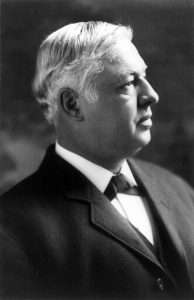The Volokh Conspiracy
Mostly law professors | Sometimes contrarian | Often libertarian | Always independent
Today in Supreme Court History: December 17, 1910
12/17/1910: Justice Joseph Rucker Lamar nominated to the Supreme Court.

Editor's Note: We invite comments and request that they be civil and on-topic. We do not moderate or assume any responsibility for comments, which are owned by the readers who post them. Comments do not represent the views of Reason.com or Reason Foundation. We reserve the right to delete any comment for any reason at any time. Comments may only be edited within 5 minutes of posting. Report abuses.
Please to post comments


According to ChatGPT, he delivered the opinion in Kringle v. Scrooge, that Santa had an easement in the chimney and Christmas tree area of most houses, and therefore shooting Santa was not actionable so long as the Jolly Old elf doesn't wanted into other parts of the home.
The future of jurisprudence.
Ha
*was* actionable.
Free the edit button!
...and edit is still not working.
Illinois Central R.R. Co. v. McKendree, 203 U.S. 514 (decided December 17, 1906): Secretary of Agriculture can’t make a regulation (here, a “quarantine line” from California to Maryland to control cattle infection) that affects interstate commerce without specific Congressional authority; regulation also affected intrastate commerce and being indivisible was void in its entirety
NLRB v. Saviar Mfg. Co., 245 U.S. 359 (decided December 17, 1973): certification of union voided where before certification election the union promised that anyone who voted for certification would have their initiation dues waived
Arlan’s Dept. Store of Louisville v. Kentucky, 371 U.S. 218 (decided December 17, 1962): dismisses First Amendment Establishment Clause objections to state statute prohibiting employing persons on Sunday; in dissent Douglas makes the point (obvious to us nowadays) that Judaism and Islam don’t use Sunday as the sabbath
I think with the Sabbath decisions Warren went along with Frank 'n Furter because Frankfurter was Jewish so Warren didn't think something Frankfurter approved could be anti-Jewish.
While I contemplate that, I think I'll have a nice juicy steak. Wait, never mind.
The then WASP town of Reading, MA was challenged by a Jewish store owner and Stone's was allowed to be open on Sundays but had to close by sundown Friday and all day Saturday.
Would a 1A challenge to Blue Laws banning alcohol sales on Sunday succeed today? If so, why would the Kentucky case be different now?
McKendree is, in retrospect, a really important case. Probably didn't seem like one at the time, but the indivisibility of local and interstate commerce is one of the central principles that led us to Wickard and Raich.
Good point
Every source I checked, including the biography written by his widow, says that Jospeh Rucker Lamar was nominated to the Court by President Taft on December 12, 1910, confirmed by the Senate on December 15, and sworn in on January 3, 1911.
Rucker succeeded Justice William Henry Moody, whose tenure on the Court had lasted only four years, cut short by a crippling arthritis that would force him to retire. Rucker suffered a similar fate, struck by a paralytic stroke less than five years into his tenure and dying a few months later.
The NYT for January 4, 1911 says that Lamar and Van Deventer were both sworn in on January 3. And an article datelined December 11 reported that Rucker "will be named" tomorrow at noon. (I don't see an article reporting that it actually happened, but your facts seem correct, unlike Blackman's.)
The Federal Judicial Center says this:
So it seems that this is where Blackman's mistaken December 17 date comes from.
Thank you.
On the other hand, Lamar's successor was Louis Brandeis, who lasted for nearly 23 years and whom we've all heard of. Douglas and Stevens and Kagan are the later justices to occupy the seat.
The Noble Prize for achievement in identifying error in Today in Supreme Court History is awarded to F.D. Wolf.
F.D. Wolf joins a remarkably long list of Noble laureates.